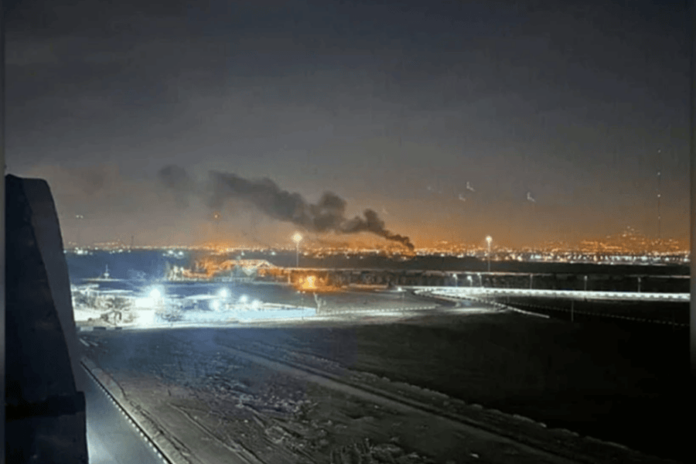DUBAI JERUSALEM CAIRO, Oct 26 – On Saturday morning, Israel launched strikes on military installations in Iran. However, this response to an Iranian assault earlier this month seemed to avoid targeting the nation’s critical oil and nuclear facilities, following urgent appeals for moderation from neighboring countries and allies.
The potential for a broader conflict involving the heavily armed nations of Israel and Iran has shaken a region already engulfed in violence in Gaza and Lebanon. However, it remains uncertain whether the recent overnight attacks will lead to an increase in hostilities.
The Israeli military announced that numerous aircraft carried out three successive attacks on missile production facilities and other locations before daybreak, cautioning its heavily armed adversary against retaliating.
Iran reported that its air defense systems effectively thwarted the assault, although it resulted in the deaths of two soldiers and caused minor damage at certain sites. A semi-official news outlet in Iran promised a commensurate response to the Israeli attacks.
Since the attack on Israel by Hamas, which is supported by Iran, on October 7, 2023, the strain between Iran and Israel has escalated significantly.
Concerns about a potential escalation have heightened since October 1, when Iran fired approximately 200 ballistic missiles at Israel, resulting in the death of one individual in the Israeli-occupied West Bank, as a reaction to prior actions taken by Israel.
The escalating tensions in Lebanon, fueled by Israel’s aggressive efforts to combat Hezbollah—its primary regional adversary backed by Iran—are intensifying the situation as Israel seeks to prevent rocket attacks into its northern territories.
As the United States and several nations in the Middle East call for caution, attention is focused on Iran and its reaction to the attacks that occurred on Saturday.
The Foreign Ministry of Tehran stated that Iran has the right and duty to protect itself, while also acknowledging its responsibilities for maintaining peace and security in the region. This represents a more diplomatic tone compared to previous responses during times of heightened tensions.
Iranian news outlets broadcast videos of travelers at Tehran’s Mehrabad Airport, apparently intended to convey that the situation was largely unaffected. Local reports indicated that explosions occurred over several hours in the city and at adjacent military installations.
Israel’s military indicated that it did not anticipate an immediate reaction from Iran, stating that there would be no alterations to the public safety measures in place nationwide.
Required to reply
The Israeli military reported that it targeted facilities for missile production and surface-to-air missile systems, noting that its aircraft returned safely after the operation.
The military stated, Should the Iranian regime choose to escalate tensions again, we will have no choice but to take action.
According to a U.S. official, the targets excluded energy infrastructure and Iran’s nuclear sites.
U.S. President Joe Biden cautioned that Washington, which is Israel’s primary ally and arms provider, would not endorse an assault on Iran’s nuclear facilities. He also suggested that Israel explore other options instead of targeting Iran’s oil reserves.
Iranian officials have consistently cautioned Israel against launching any strikes, yet they did not make a definitive commitment to respond on Saturday.
The semi-official Tasnim news agency reported on Saturday, referencing sources, that Israel can expect a response that is commensurate with any actions it undertakes.
A high-ranking official in the Biden administration stated that Israel’s focused and measured attacks ought to conclude the direct hostilities between the two nations. However, he emphasized that the United States stands ready to defend Israel again should Iran decide to retaliate.
U.S. Notified Prior to Attacks
Iranian media broadcast footage of air defense systems persistently engaging what appeared to be incoming missiles in central Tehran, though they did not specify the locations being targeted.
Tasnim announced that the Islamic Revolutionary Guard Corps facilities targeted in the recent attacks remained intact. Additionally, it stated that Iran would be resuming flights starting at 9 a.m. local time (05:30 GMT) following a halt during Israel’s offensive. Similarly, Iraq is also set to restart its flights, according to its state news agency.
According to a report from Jordanian television, a military source indicated that no aircraft were permitted to enter the nation’s airspace. Similarly, a Saudi official confirmed that Saudi airspace was not utilized for the attack.
According to the Syrian state news agency SANA, Israel conducted airstrikes targeting military installations in central and southern Syria early Saturday morning. However, Israel has yet to verify these strikes.
According to Israel, Prime Minister Benjamin Netanyahu, Defence Minister Yoav Gallant, and various other officials monitored the operation from the military’s command and control center located in Tel Aviv.
Following the commencement of Israel’s military actions, Gallant had a conversation with U.S. Defense Secretary Lloyd Austin. According to the Pentagon, Austin highlighted the United States’ strengthened military presence aimed at safeguarding American personnel, as well as Israel and its allies in the area.
A U.S. official stated that Israel notified the United States before executing the strike, but Washington was not involved in the operation.
Saudi Arabia, having repaired its relationship with Iran following years of regional competition and moving closer to Israel prior to the conflict in Gaza, denounced the assault as an infringement on Iranian sovereignty and a breach of international law.
Negotiators are anticipated to return to Doha on Sunday to continue their attempts to establish a ceasefire and an agreement for the release of hostages in Gaza, which may contribute to easing the broader conflict.

